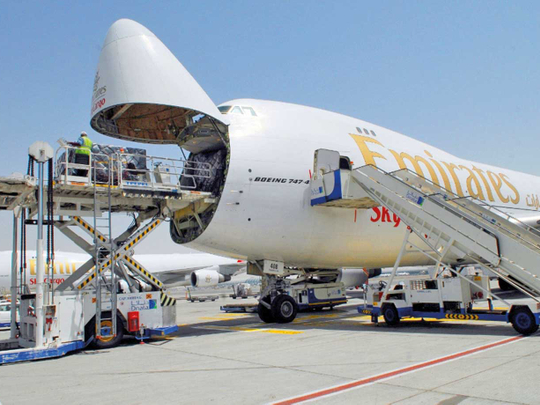
Dubai
The UAE’s air freight market is expected to grow an annual compound rate of 4.8 per cent between 2017 and 2021, driven by expansion projects and new investments within the UAE’s logistics sector.
According to a report on Wednesday from the Dubai Chamber of Commerce and Industry, improvements to the logistics infrastructure will strengthen Dubai’s position as a global trade hub.
The report showed that demand within the UAE’s air freight market increased at an annual compound rate of 8.6 per cent between 2012 and 2016.
In 2016, Dubai International Airport handled 2.6 million tonnes of cargo, with freight volume growth rates at 3.8 per cent, the analysis showed, while Abu Dhabi Airport handled nearly 800,000 tonnes of cargo during the same year.
In 2017, air freight volumes at Dubai International Airport are expected to grow 5 per cent, and increase at an annual compound rate of 3.2 per cent over the next five years. At Abu Dhabi Airport, air freight volumes are projected to grow 12 per cent this year, and record a growth rate of 5.2 per cent over the 2017-2021 period.
The UAE’s two leading airports have been investing in expanding their facilities in recent years. Emirates SkyCargo, for example, opened a new pharmaceuticals facility at Dubai International Airport to accommodate growing demand for pharmaceutical and cold storage products.
The expansion of cold-chain logistics services at both airports is expected to further increase air freight volumes in the UAE.
Both Emirates and Etihad Airways are expected to continue contributing to higher air cargo volumes over the next five years, the Dubai Chamber said.
Hamad Bu Amim, president and chief executive officer at the Dubai Chamber of Commerce, said that the logistics sector was among the key drivers of economic growth.
The Chamber’s analysis also highlighted the potential impact of expanding ports in the UAE and further developing their facilities.
Jebel Ali Port, managed by DP World, is investing $1.6 billion to increase the port’s total capacity to 22.1 million containers. Similarly, Abu Dhabi Ports Company plans to expand Khalifa Port by 100 square kilometres by mid-2018 to accommodate more industries and keep up with growth in the sector.











